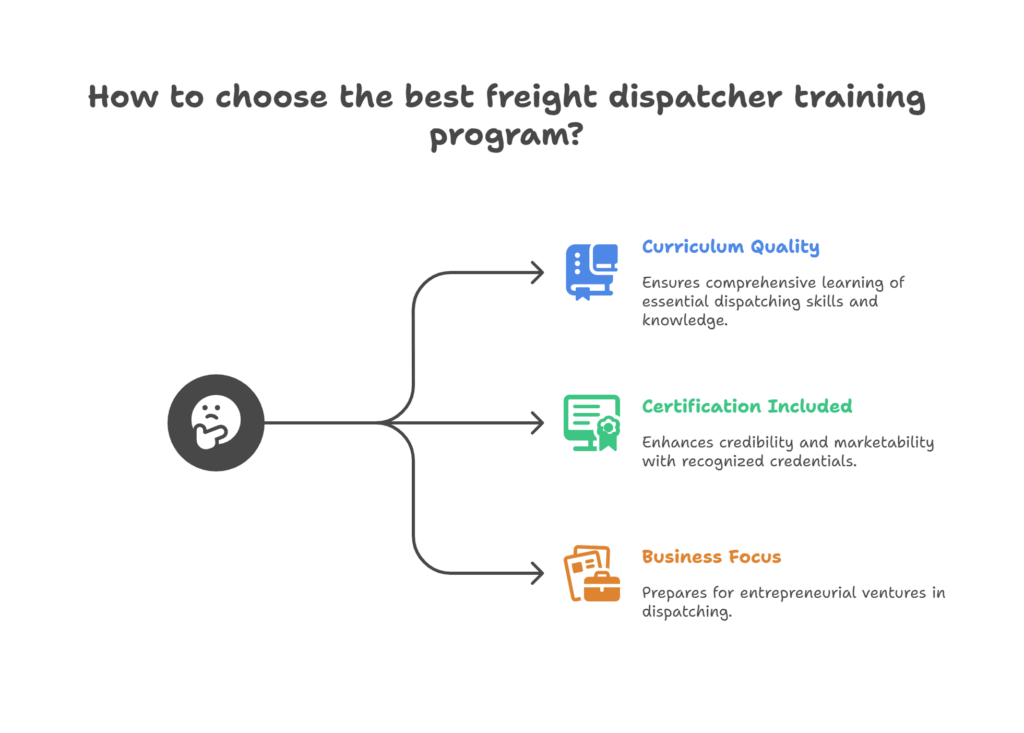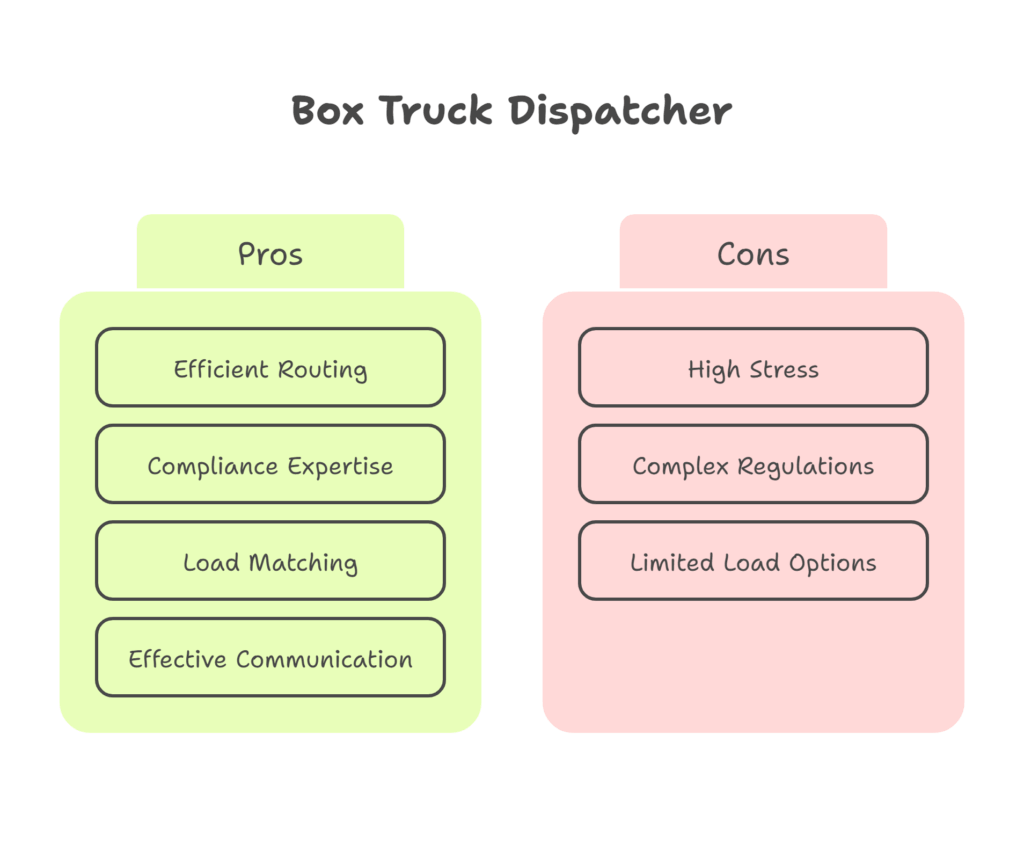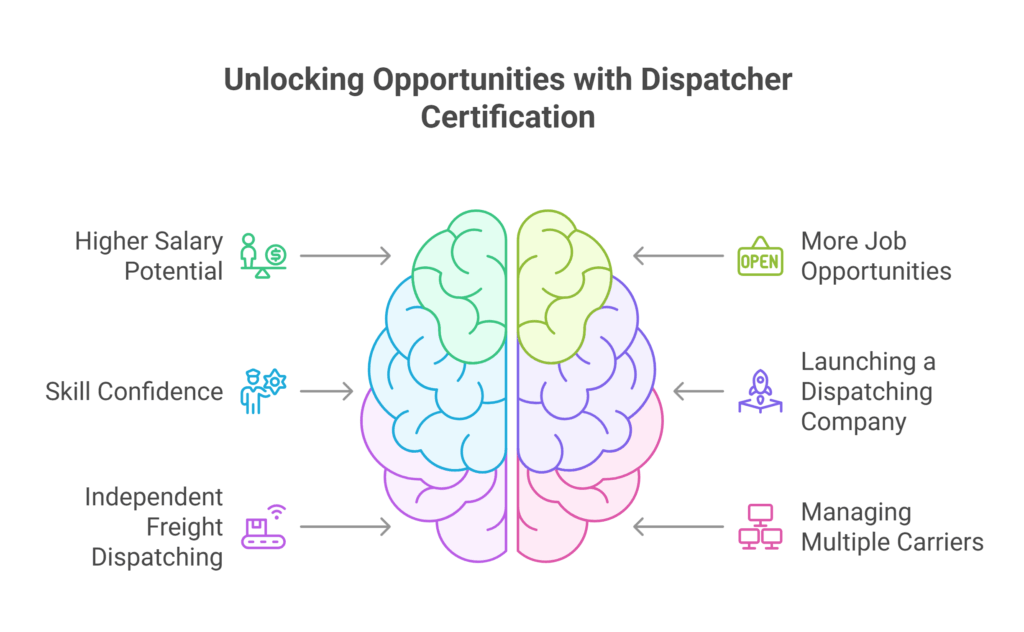Freight dispatching is one of the fastest-growing career paths in the logistics industry. Whether you’re interested in working with box trucks, learning to manage full fleets, or starting your own dispatching business, proper training is the key to long-term success. From certifications to hands-on programs, choosing the best freight dispatcher training can determine how well you stand out in a competitive market.
In this guide, you’ll learn everything about: choosing the right truck dispatcher school, earning a freight dispatcher certification, finding the best freight dispatcher training for your goals, and mastering dispatch skills for box trucks and larger fleets.
What Is Freight Dispatching and Why Training Matters
Freight dispatchers are the behind-the-scenes pros who connect carriers with loads, communicate with drivers, and ensure routes are optimized for cost and delivery. The right dispatcher training gives you the technical and business skills to succeed in this role (FMCSA, n.d.).
Why Get Certified?
- A freight dispatcher certification proves your skills and increases job opportunities (FMCSA, n.d.).
- Courses like a truck dispatcher certification or load dispatcher training teach you how to navigate load boards, manage carrier relationships, and stay compliant.
- Many employers prefer candidates who’ve completed a recognized dispatcher training program.
“Freight dispatchers are the hidden conductors of logistics. A skilled dispatcher keeps freight moving, minimizes downtime, and becomes a strategic asset for carriers.”
How do you think the dispatcher’s role will evolve with advancing tech in the next five years?
How to Choose the Best Freight Dispatcher Training
With so many options online and offline, selecting the right truck dispatcher course or dispatching school can be overwhelming. Use this checklist to evaluate programs:
1. Curriculum Quality
Look for courses that include key modules essential to the role:
- Load board navigation: Learn how to use popular platforms like DAT and TruckStop to find loads for carriers in real time.
- Carrier onboarding processes: Understand how to properly vet and set up carriers with contracts, insurance verification, and compliance procedures.
- Legal and compliance training: Get equipped with knowledge about FMCSA regulations, driver hours of service, and freight documentation to ensure you’re always operating within legal guidelines.
- Real-world simulations: Participate in dispatch scenarios that simulate day-to-day challenges like driver delays, missed pickups, or last-minute rate negotiations to build practical decision-making skills.
2. Certification Included
Ensure the program provides recognized credentials that will boost your credibility:
- A recognized freight dispatcher certification: For example, a certificate from a program endorsed by logistics industry bodies or used by employers.
- Optional truck dispatcher certification: Some programs offer this additional layer of specialization, especially valuable if you plan to work with full truckload (FTL) or less-than-truckload (LTL) carriers.
- Access to real dispatching tools: Training should include hands-on practice with tools like TMS software (e.g., Tailwind, TruckLogics) so you can hit the ground running.
3. Business Focus
Top truck dispatcher training course options also prepare you to run your own operation:
- Start your own dispatching business: Learn how to register your business, market your services to carriers, and manage invoicing and contracts.
- Work with independent owner-operators: Understand how to build long-term relationships with carriers who need reliable dispatching support.
- Understand freight contracts and negotiations: Get tips and scripts for negotiating rates, drafting carrier agreements, and managing disputes with professionalism and legal safety.

“Not all training is created equal. Look for programs that offer hands-on tools, real-world scenarios, and tech integrations, those are what make dispatchers job-ready.”
What features would you prioritize in a dispatcher course, mentorship, platform access, or certification?
Top Dispatcher Learning Paths: Online and In-Person Options
If you’re ready to learn dispatch, here are the best ways to get started.
1. Online Courses
These are flexible and often self-paced. Great for anyone starting with dispatcher classes from home, many programs are designed for box truck dispatcher training, and online dispatching course options include video modules, quizzes, and live coaching.
Top Online Sites That Provide Dispatcher Courses
If you’re looking for reliable platforms to begin your dispatcher journey, consider these top-rated options:
- Udemy: Offers beginner-friendly truck dispatcher training courses with lifetime access (Udemy, 2024).
- Freight Broker Boot Camp: A comprehensive site for both freight broker and dispatcher training.
- Dispatch My Load Academy: Specializes in box truck dispatcher training with mentorship options.
- Coursera: While not focused exclusively on freight, you can find logistics and transportation-related dispatch content (Coursera, 2024).
- Skillshare: Some courses available on logistics and business operations that support dispatching fundamentals. Each platform varies in price, certification type, and depth, so be sure to explore which aligns with your career goals.
2. Dispatcher Schools
A formal truck dispatcher school offers structured, in-depth in-person instruction and hands-on learning experiences.
- Experienced instructors guide you through real-world freight matching and dispatch scenarios.
- Provides valuable networking opportunities with industry professionals and peers.
- Offers a comprehensive curriculum covering legal, compliance, and business management topics.
- Ideal for learners who thrive in a classroom environment and prefer guided mentorship.
Top Dispatcher Schools to Consider
If you’re looking to enroll in a reputable truck dispatcher school, consider these top programs:
- Freight Dispatcher Academy: Known for thorough curriculum and certification preparation.
- Dispatch Masters School: Offers both online and in-person options with job placement support.
- Load Planner Institute: Focuses on practical dispatching skills with live instructor sessions.
- National Dispatch Training Center: Provides specialized courses for box truck and freight dispatchers with career coaching.
Each of these schools has a strong reputation for preparing students for certification and real-world dispatching careers.
“The right online course should simulate live dispatching. If it doesn’t show you how to manage loads, handle issues, and use actual freight tech, it’s not worth your time.”
Ready to take the next step? Explore how SPI’s freight broker technology can support your dispatching journey
What is Box Truck Dispatcher
If you’re planning to dispatch for smaller fleets or independent contractors, box truck dispatcher training is crucial. Here’s why:
A box truck dispatcher specializes in managing freight shipments for box trucks, smaller, enclosed trucks typically used for local or regional deliveries. Unlike larger tractor-trailers, box trucks have unique operational needs and regulations.
Key responsibilities include:
- Route Planning: Navigating urban routes with traffic, delivery windows, and parking restrictions to maximize efficiency and avoid delays.
- Compliance Management: Ensuring all local permits, weight limits, and parking laws specific to box trucks are met to avoid fines or interruptions.
- Load Matching: Finding appropriate smaller loads suited to box truck capacities, often focusing on niche markets like last-mile delivery, retail distribution, or specialty cargo such as furniture or appliances.
- Client and Driver Communication: Coordinating with independent owner-operators or small fleet drivers to manage schedules, pickups, and deliveries while providing support during challenges.

Specialized box truck dispatcher training helps you master these unique logistics challenges, compliance requirements, and customer expectations. It also pairs well with load dispatcher training by sharpening your ability to find and manage the right freight loads for smaller trucks (Truckstop, 2024).
“Specialization pays off. Whether it’s box trucks, reefer units, or hazmat, when you niche down, you increase your value and control your earning potential.”
Do niche certifications make a real impact on dispatcher earnings or just resume appeal?
Benefits of Dispatcher Certification and School Training
Here’s what sets certified dispatchers apart:
Career Benefits
- Higher salary potential: Certified dispatchers often command better pay because their verified skills and industry knowledge make them more valuable to employers. Certification signals professionalism and expertise, which can lead to salary negotiations and promotions.
- More job opportunities: Many logistics companies, freight brokers, and carriers prefer or require candidates with formal certification, opening more doors for employment and career advancement.
- Skill confidence from dispatcher training programs: Completing a comprehensive training program equips you with practical knowledge and problem-solving skills, increasing your confidence to handle real-world dispatch challenges efficiently and effectively.
Business Opportunities
- Launch your own dispatching company: Certification and formal training provide the essential knowledge needed to start and manage your own freight dispatch business, including handling contracts, compliance, and client management.
- Work as an independent freight dispatcher: Many certified dispatchers operate as freelancers, partnering with owner-operators or small fleets, allowing flexibility and multiple income streams.
- Manage loads for multiple carriers: With advanced training, dispatchers gain the skills to juggle multiple clients and freight loads simultaneously, maximizing their earning potential and growing their business footprint.

“Certification isn’t just a paper credential, it gives clients confidence, helps you negotiate better rates, and separates pros from part-timers.”
Want to become part of a high-performing freight network? Discover how SPI supports its agents.
Frequently Asked Questions (FAQs)
1. Is a freight dispatcher certification necessary?
Yes, many employers require or prefer a freight dispatcher certification, especially for entry-level applicants.
2. What’s the difference between dispatcher classes and a dispatcher school?
Dispatcher classes can be online or short-term, while a dispatching school offers a more in-depth and immersive experience.
3. Can I learn dispatch on my own?
You can, but structured dispatcher training will accelerate your learning and increase your credibility in the industry.
4. Which is the best freight dispatcher training for box trucks?
Look for box truck dispatcher training that includes compliance, routing, and load matching for smaller fleets.
Start Your Dispatching Career Right
The freight world moves fast, and so can your career with the right training. Whether you’re looking for the best freight dispatcher training, a top-rated truck dispatcher school, or a flexible dispatching course, your path starts with education.
Choose a program that offers: freight dispatcher certification, practical load dispatcher training, flexible formats such as an online truck dispatcher course or an in-person dispatching school, and specialized options like box truck dispatcher training.
Ready to strengthen your supply chain security? Contact us to build a safer, smarter logistics strategy.
References
Coursera. (2024). Dispatcher courses and certifications. Retrieved from https://www.coursera.org
FMCSA. (n.d.). Becoming a freight dispatcher. Retrieved from https://www.fmcsa.dot.gov
Truckstop. (2024). Freight tools and dispatcher insights. Retrieved from https://truckstop.com
Udemy. (2024). Online truck dispatcher courses. Retrieved from https://www.udemy.com




